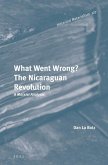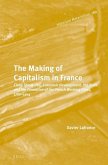- Gebundenes Buch
- Merkliste
- Auf die Merkliste
- Bewerten Bewerten
- Teilen
- Produkt teilen
- Produkterinnerung
- Produkterinnerung
This Reader includes selections from Ellen Meiksins Wood's groundbreaking scholarship, providing an overview of her original interpretations of capitalism, precapitalist societies, the state, political theory, democracy, citizenship, liberalism, civil society, the Enlightenment, globalization, imperialism, and socialism.
Andere Kunden interessierten sich auch für
![The Antagonistic Principle The Antagonistic Principle]() Massimo ModonesiThe Antagonistic Principle172,99 €
Massimo ModonesiThe Antagonistic Principle172,99 €![Gramsci's Political Thought Gramsci's Political Thought]() Carlos Nelson CoutinhoGramsci's Political Thought182,99 €
Carlos Nelson CoutinhoGramsci's Political Thought182,99 €![The Revolutionary Marxism of Antonio Gramsci The Revolutionary Marxism of Antonio Gramsci]() Frank RosengartenThe Revolutionary Marxism of Antonio Gramsci181,99 €
Frank RosengartenThe Revolutionary Marxism of Antonio Gramsci181,99 €![The Dutch and German Communist Left (1900-68) The Dutch and German Communist Left (1900-68)]() Philippe BourrinetThe Dutch and German Communist Left (1900-68)316,99 €
Philippe BourrinetThe Dutch and German Communist Left (1900-68)316,99 €![Workers' Self-Management in Argentina Workers' Self-Management in Argentina]() Marcelo VietaWorkers' Self-Management in Argentina279,99 €
Marcelo VietaWorkers' Self-Management in Argentina279,99 €![What Went Wrong? the Nicaraguan Revolution What Went Wrong? the Nicaraguan Revolution]() Dan La BotzWhat Went Wrong? the Nicaraguan Revolution242,99 €
Dan La BotzWhat Went Wrong? the Nicaraguan Revolution242,99 €![The Making of Capitalism in France The Making of Capitalism in France]() Xavier LafranceThe Making of Capitalism in France195,99 €
Xavier LafranceThe Making of Capitalism in France195,99 €-
-
-
This Reader includes selections from Ellen Meiksins Wood's groundbreaking scholarship, providing an overview of her original interpretations of capitalism, precapitalist societies, the state, political theory, democracy, citizenship, liberalism, civil society, the Enlightenment, globalization, imperialism, and socialism.
Hinweis: Dieser Artikel kann nur an eine deutsche Lieferadresse ausgeliefert werden.
Hinweis: Dieser Artikel kann nur an eine deutsche Lieferadresse ausgeliefert werden.
Produktdetails
- Produktdetails
- Verlag: Brill
- Seitenzahl: 352
- Erscheinungstermin: 12. Oktober 2012
- Englisch
- Abmessung: 241mm x 160mm x 23mm
- Gewicht: 680g
- ISBN-13: 9789004230088
- ISBN-10: 9004230084
- Artikelnr.: 35970358
- Herstellerkennzeichnung
- Produktsicherheitsverantwortliche/r
- Europaallee 1
- 36244 Bad Hersfeld
- gpsr@libri.de
- Verlag: Brill
- Seitenzahl: 352
- Erscheinungstermin: 12. Oktober 2012
- Englisch
- Abmessung: 241mm x 160mm x 23mm
- Gewicht: 680g
- ISBN-13: 9789004230088
- ISBN-10: 9004230084
- Artikelnr.: 35970358
- Herstellerkennzeichnung
- Produktsicherheitsverantwortliche/r
- Europaallee 1
- 36244 Bad Hersfeld
- gpsr@libri.de
Ellen Meiksins Wood is Professor Emerita in the Department of Political Science, York University. She is the author of numerous books, including Democracy against Capitalism, The Origin of Capitalism, Citizens to Lords and, most recently, Liberty and Property. Larry Patriquin is Associate Professor of Social Welfare and Social Development, Nipissing University. He is the author of Inventing Tax Rage and Agrarian Capitalism and Poor Relief in England, 1500-1860.
Preface
Acknowledgements
Introduction: The 'Method' of Ellen Meiksins Wood
1. Capitalism
The 'economic' and the 'political' in capitalism
Class-power and state-power
Feudalism and private property
Capitalism as the privatisation of political power
The localisation of class-struggle
England vs. the dominant model of capitalism
The bourgeois paradigm
Begging the question
Opportunity or imperative?
The commercialisation-model
Marx on the transition
Towns and trade
Agrarian capitalism
Market-dependent producers
A different kind of market-dependence?
Competitive markets
2. Precapitalist Societies
Class and state in China and Rome
Rome and the empire of private property
The city-states of Florence and Venice
Master and slave vs. landlord and peasant
Free producers and slaves
Slavery and the 'decline' of the Roman Empire
The 'logic' of slavery vs. the logic of capitalism
The 'slave-mode of production'
Agricultural slavery and the peasant-citizen
The nexus of freedom and slavery in democratic Athens
3. The State in Historical Perspective
Class and state in ancient society
The emergence of the polis in ancient Athens
The 'essence' of the polis
Class in the democratic polis
Village and state, town and country, in democratic Athens
The rise and fall of Rome
The culture of property: the Roman law
From imperial Rome to 'feudalism'
Absolutism and the modern state
The idea of the state
The peculiarities of the English state
Contrasting states: France vs. England
4. Social and Political Thought
The social history of political theory
Political theory in history: an overview
Plato
The Greek concept of freedom
Jean-Jacques Rousseau
John Locke
Revolution and tradition, c. 1640-1790
5. Democracy, Citizenship, Liberalism, and Civil Society
Labour and democracy, ancient and modern
From ancient to modern conceptions of citizenship
Capitalism and democratic citizenship
The American redefinition of democracy
A democracy devoid of social content
From democracy to liberalism
Capitalism and 'liberal democracy'
Liberal democracy and capitalist hegemony
The idea of 'civil society'
The civil-society argument
'Civil society' and the devaluation of democracy
6. The Enlightenment, Postmodernism, and the Post-'New Left'
Modernity vs. capitalism: France vs. England
From modernity to postmodernity
Modernity and the non-history of capitalism
Themes of the postmodern left
Enlightenment vs. capitalism: Condorcet vs. Locke
Enlightenment-universalism
The periodisation of the Western left
Left-intellectuals and contemporary capitalism
7. Globalisation and Imperialism
Globalisation and the nation-state
Nation-states, classes, and universal capitalism
The indispensable state
Precapitalist imperialism
The classic age of imperialism
Globalisation and war
Globalisation and imperial hegemony
The contradictions of capitalist imperialism
8. Socialism
The end of the welfare-state 'compact'
There are no social democrats now
Market-dependence vs. market-enablement
Left-strategies of market-enablement
The political implications of competition
The working class and the struggle for socialism
Class-conflict and the socialist project
Socialism and democracy
The state in classless societies
Liberalism vs. democracy
'Universal human goods'
The self-emancipation of the working class
The socialist movement
Democracy as an economic mechanism
Bibliography of Works by Ellen Meiksins Wood, 1970-2012
References
Index
Acknowledgements
Introduction: The 'Method' of Ellen Meiksins Wood
1. Capitalism
The 'economic' and the 'political' in capitalism
Class-power and state-power
Feudalism and private property
Capitalism as the privatisation of political power
The localisation of class-struggle
England vs. the dominant model of capitalism
The bourgeois paradigm
Begging the question
Opportunity or imperative?
The commercialisation-model
Marx on the transition
Towns and trade
Agrarian capitalism
Market-dependent producers
A different kind of market-dependence?
Competitive markets
2. Precapitalist Societies
Class and state in China and Rome
Rome and the empire of private property
The city-states of Florence and Venice
Master and slave vs. landlord and peasant
Free producers and slaves
Slavery and the 'decline' of the Roman Empire
The 'logic' of slavery vs. the logic of capitalism
The 'slave-mode of production'
Agricultural slavery and the peasant-citizen
The nexus of freedom and slavery in democratic Athens
3. The State in Historical Perspective
Class and state in ancient society
The emergence of the polis in ancient Athens
The 'essence' of the polis
Class in the democratic polis
Village and state, town and country, in democratic Athens
The rise and fall of Rome
The culture of property: the Roman law
From imperial Rome to 'feudalism'
Absolutism and the modern state
The idea of the state
The peculiarities of the English state
Contrasting states: France vs. England
4. Social and Political Thought
The social history of political theory
Political theory in history: an overview
Plato
The Greek concept of freedom
Jean-Jacques Rousseau
John Locke
Revolution and tradition, c. 1640-1790
5. Democracy, Citizenship, Liberalism, and Civil Society
Labour and democracy, ancient and modern
From ancient to modern conceptions of citizenship
Capitalism and democratic citizenship
The American redefinition of democracy
A democracy devoid of social content
From democracy to liberalism
Capitalism and 'liberal democracy'
Liberal democracy and capitalist hegemony
The idea of 'civil society'
The civil-society argument
'Civil society' and the devaluation of democracy
6. The Enlightenment, Postmodernism, and the Post-'New Left'
Modernity vs. capitalism: France vs. England
From modernity to postmodernity
Modernity and the non-history of capitalism
Themes of the postmodern left
Enlightenment vs. capitalism: Condorcet vs. Locke
Enlightenment-universalism
The periodisation of the Western left
Left-intellectuals and contemporary capitalism
7. Globalisation and Imperialism
Globalisation and the nation-state
Nation-states, classes, and universal capitalism
The indispensable state
Precapitalist imperialism
The classic age of imperialism
Globalisation and war
Globalisation and imperial hegemony
The contradictions of capitalist imperialism
8. Socialism
The end of the welfare-state 'compact'
There are no social democrats now
Market-dependence vs. market-enablement
Left-strategies of market-enablement
The political implications of competition
The working class and the struggle for socialism
Class-conflict and the socialist project
Socialism and democracy
The state in classless societies
Liberalism vs. democracy
'Universal human goods'
The self-emancipation of the working class
The socialist movement
Democracy as an economic mechanism
Bibliography of Works by Ellen Meiksins Wood, 1970-2012
References
Index
Preface
Acknowledgements
Introduction: The 'Method' of Ellen Meiksins Wood
1. Capitalism
The 'economic' and the 'political' in capitalism
Class-power and state-power
Feudalism and private property
Capitalism as the privatisation of political power
The localisation of class-struggle
England vs. the dominant model of capitalism
The bourgeois paradigm
Begging the question
Opportunity or imperative?
The commercialisation-model
Marx on the transition
Towns and trade
Agrarian capitalism
Market-dependent producers
A different kind of market-dependence?
Competitive markets
2. Precapitalist Societies
Class and state in China and Rome
Rome and the empire of private property
The city-states of Florence and Venice
Master and slave vs. landlord and peasant
Free producers and slaves
Slavery and the 'decline' of the Roman Empire
The 'logic' of slavery vs. the logic of capitalism
The 'slave-mode of production'
Agricultural slavery and the peasant-citizen
The nexus of freedom and slavery in democratic Athens
3. The State in Historical Perspective
Class and state in ancient society
The emergence of the polis in ancient Athens
The 'essence' of the polis
Class in the democratic polis
Village and state, town and country, in democratic Athens
The rise and fall of Rome
The culture of property: the Roman law
From imperial Rome to 'feudalism'
Absolutism and the modern state
The idea of the state
The peculiarities of the English state
Contrasting states: France vs. England
4. Social and Political Thought
The social history of political theory
Political theory in history: an overview
Plato
The Greek concept of freedom
Jean-Jacques Rousseau
John Locke
Revolution and tradition, c. 1640-1790
5. Democracy, Citizenship, Liberalism, and Civil Society
Labour and democracy, ancient and modern
From ancient to modern conceptions of citizenship
Capitalism and democratic citizenship
The American redefinition of democracy
A democracy devoid of social content
From democracy to liberalism
Capitalism and 'liberal democracy'
Liberal democracy and capitalist hegemony
The idea of 'civil society'
The civil-society argument
'Civil society' and the devaluation of democracy
6. The Enlightenment, Postmodernism, and the Post-'New Left'
Modernity vs. capitalism: France vs. England
From modernity to postmodernity
Modernity and the non-history of capitalism
Themes of the postmodern left
Enlightenment vs. capitalism: Condorcet vs. Locke
Enlightenment-universalism
The periodisation of the Western left
Left-intellectuals and contemporary capitalism
7. Globalisation and Imperialism
Globalisation and the nation-state
Nation-states, classes, and universal capitalism
The indispensable state
Precapitalist imperialism
The classic age of imperialism
Globalisation and war
Globalisation and imperial hegemony
The contradictions of capitalist imperialism
8. Socialism
The end of the welfare-state 'compact'
There are no social democrats now
Market-dependence vs. market-enablement
Left-strategies of market-enablement
The political implications of competition
The working class and the struggle for socialism
Class-conflict and the socialist project
Socialism and democracy
The state in classless societies
Liberalism vs. democracy
'Universal human goods'
The self-emancipation of the working class
The socialist movement
Democracy as an economic mechanism
Bibliography of Works by Ellen Meiksins Wood, 1970-2012
References
Index
Acknowledgements
Introduction: The 'Method' of Ellen Meiksins Wood
1. Capitalism
The 'economic' and the 'political' in capitalism
Class-power and state-power
Feudalism and private property
Capitalism as the privatisation of political power
The localisation of class-struggle
England vs. the dominant model of capitalism
The bourgeois paradigm
Begging the question
Opportunity or imperative?
The commercialisation-model
Marx on the transition
Towns and trade
Agrarian capitalism
Market-dependent producers
A different kind of market-dependence?
Competitive markets
2. Precapitalist Societies
Class and state in China and Rome
Rome and the empire of private property
The city-states of Florence and Venice
Master and slave vs. landlord and peasant
Free producers and slaves
Slavery and the 'decline' of the Roman Empire
The 'logic' of slavery vs. the logic of capitalism
The 'slave-mode of production'
Agricultural slavery and the peasant-citizen
The nexus of freedom and slavery in democratic Athens
3. The State in Historical Perspective
Class and state in ancient society
The emergence of the polis in ancient Athens
The 'essence' of the polis
Class in the democratic polis
Village and state, town and country, in democratic Athens
The rise and fall of Rome
The culture of property: the Roman law
From imperial Rome to 'feudalism'
Absolutism and the modern state
The idea of the state
The peculiarities of the English state
Contrasting states: France vs. England
4. Social and Political Thought
The social history of political theory
Political theory in history: an overview
Plato
The Greek concept of freedom
Jean-Jacques Rousseau
John Locke
Revolution and tradition, c. 1640-1790
5. Democracy, Citizenship, Liberalism, and Civil Society
Labour and democracy, ancient and modern
From ancient to modern conceptions of citizenship
Capitalism and democratic citizenship
The American redefinition of democracy
A democracy devoid of social content
From democracy to liberalism
Capitalism and 'liberal democracy'
Liberal democracy and capitalist hegemony
The idea of 'civil society'
The civil-society argument
'Civil society' and the devaluation of democracy
6. The Enlightenment, Postmodernism, and the Post-'New Left'
Modernity vs. capitalism: France vs. England
From modernity to postmodernity
Modernity and the non-history of capitalism
Themes of the postmodern left
Enlightenment vs. capitalism: Condorcet vs. Locke
Enlightenment-universalism
The periodisation of the Western left
Left-intellectuals and contemporary capitalism
7. Globalisation and Imperialism
Globalisation and the nation-state
Nation-states, classes, and universal capitalism
The indispensable state
Precapitalist imperialism
The classic age of imperialism
Globalisation and war
Globalisation and imperial hegemony
The contradictions of capitalist imperialism
8. Socialism
The end of the welfare-state 'compact'
There are no social democrats now
Market-dependence vs. market-enablement
Left-strategies of market-enablement
The political implications of competition
The working class and the struggle for socialism
Class-conflict and the socialist project
Socialism and democracy
The state in classless societies
Liberalism vs. democracy
'Universal human goods'
The self-emancipation of the working class
The socialist movement
Democracy as an economic mechanism
Bibliography of Works by Ellen Meiksins Wood, 1970-2012
References
Index








